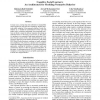Free Online Productivity Tools
i2Speak
i2Symbol
i2OCR
iTex2Img
iWeb2Print
iWeb2Shot
i2Type
iPdf2Split
iPdf2Merge
i2Bopomofo
i2Arabic
i2Style
i2Image
i2PDF
iLatex2Rtf
Sci2ools
AAAI
2015
2015
Cognitive Social Learners: An Architecture for Modeling Normative Behavior
In many cases, creating long-term solutions to sustainability issues requires not only innovative technology, but also largescale public adoption of the proposed solutions. Social simulations are a valuable but underutilized tool that can help public policy researchers understand when sustainable practices are likely to make the delicate transition from being an individual choice to becoming a social norm. In this paper, we introduce a new normative multi-agent architecture, Cognitive Social Learners (CSL), that models bottom-up norm emergence through a social learning mechanism, while using BDI (Belief/Desire/Intention) reasoning to handle adoption and compliance. CSL preserves a greater sense of cognitive realism than influence propagation or infectious transmission approaches, enabling the modeling of complex beliefs and contradictory objectives within an agent-based simulation. In this paper, we demonstrate the use of CSL for modeling norm emergence of recycling practices and pub...
Related Content
| Added | 27 Mar 2016 |
| Updated | 27 Mar 2016 |
| Type | Journal |
| Year | 2015 |
| Where | AAAI |
| Authors | Rahmatollah Beheshti, Awrad Mohammed Ali, Gita Reese Sukthankar |
Comments (0)

